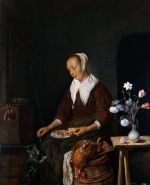Messengers
 Delft employed several messengers (boden). Their major function was to carry messages between the officials in the Stadhuis and the people of Delft. One of them was a traveling messenger (reisende bode), who would travel from Delft to other cities. They were also paid for their services helping the city inspectors, especially those for beer, wine, and milling, at the Waag behind the Stadhuis. Since these inspectors were often camerbewaarders, the four court messengers were probably subordinate to them in the Stadhuis, too. They also were authorized to collect fines, for example, the four court messengers, referred to as the gentlemen's servants ('s heeren dienaars), for violations of the trash collection ordinances noted by the supervisors (crebbemeesters).
Delft employed several messengers (boden). Their major function was to carry messages between the officials in the Stadhuis and the people of Delft. One of them was a traveling messenger (reisende bode), who would travel from Delft to other cities. They were also paid for their services helping the city inspectors, especially those for beer, wine, and milling, at the Waag behind the Stadhuis. Since these inspectors were often camerbewaarders, the four court messengers were probably subordinate to them in the Stadhuis, too. They also were authorized to collect fines, for example, the four court messengers, referred to as the gentlemen's servants ('s heeren dienaars), for violations of the trash collection ordinances noted by the supervisors (crebbemeesters).
The Dutch bode became the word for postal carriers.
In 1660, the year Leeuwenhoek began his long career as camerbewaarder of the magistrates' chamber, Andries van der Goes was treasurer. In that year's Rekeningen van de thesaurier, his account books (cover on the right; click to enlarge), the messengers are listed with the camerbewaarders after the city managers, doctors, and surgeons, but before the clergymen and other church workers such as the organists.

















